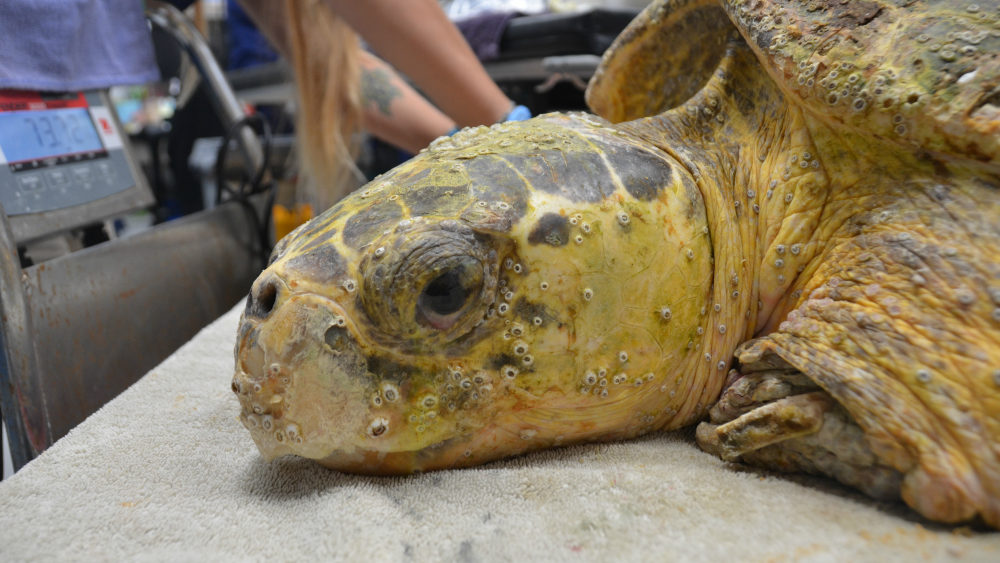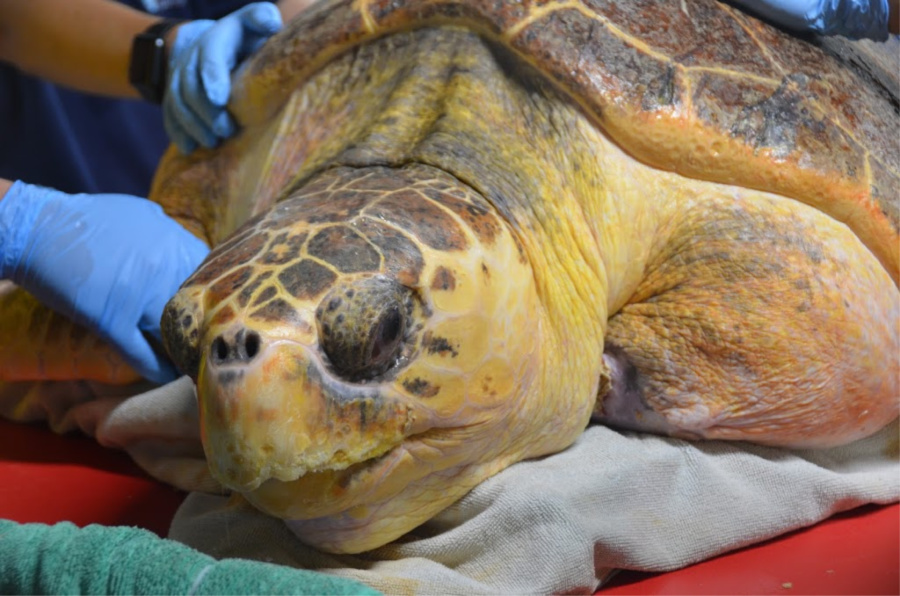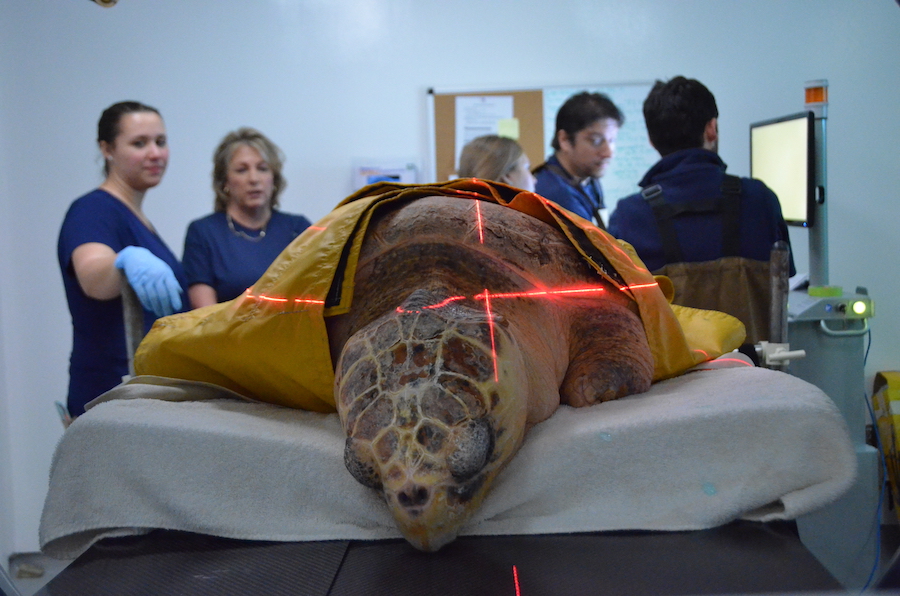Loggerhead (Caretta caretta)
Stranding Location: Deewees Island, SC
Arrival Date: 7/5/2018
Age: Adult
Weight: 72.62 kg (160 lbs)
Case History
Professor McGonagall was found by Captain Beau of Barrier Island Eco Tours, and Dewees Island naturalist, Lori. This adult female loggerhead sea turtle was clearly in distress, as she was struggling to dive and swimming in an abnormal pattern. Additionally, McGonagall was missing her entire left front flipper. Luckily, Beau and Lori jumped right to action. They called the South Carolina Department of Natural Resources (SCDNR), and, with their guidance, safely pulled McGonagall from the water. Given her large size, they used a line to hoist her into the boat, which was no small feat considering she weighs nearly 200 pounds! They then boated over to the Isle of Palms Marina to meet SCDNR transporters, Mary Pringle and Barb Gobien. Barb and Mary transported McGonagall the rest of the way to the Sea Turtle Care Center (STCC) for treatment.
Treatment
Professor McGonagall was very lethargic when she arrived at the South Carolina Aquarium. She had multiple wounds on all flippers, with distinct jaw marks from a shark on her carapace (top shell). Given her missing front flipper and the location of the wounds, she was most likely attacked by quite a large shark. Sharks, although natural predators of sea turtles, usually do not go after healthy adult loggerheads. Given the severity of her injuries, we speculated that there must be underlying issues. She was underweight, with her shell soft along the outermost scutes and bottom shell. Blood work indicated she was anemic and dehydrated, so she received fluids, vitamins, and was started on antibiotics to prevent any infection from forming in the missing front flipper and associated wounds. The fibrin and tissue on her wounds suggest that this injury occurred approximately a week ago. Vet staff also administered pain medication to help with any discomfort she was feeling from the predator attack. After triage, we placed McGonagall in a shallow water tank down in ICU.
Updates
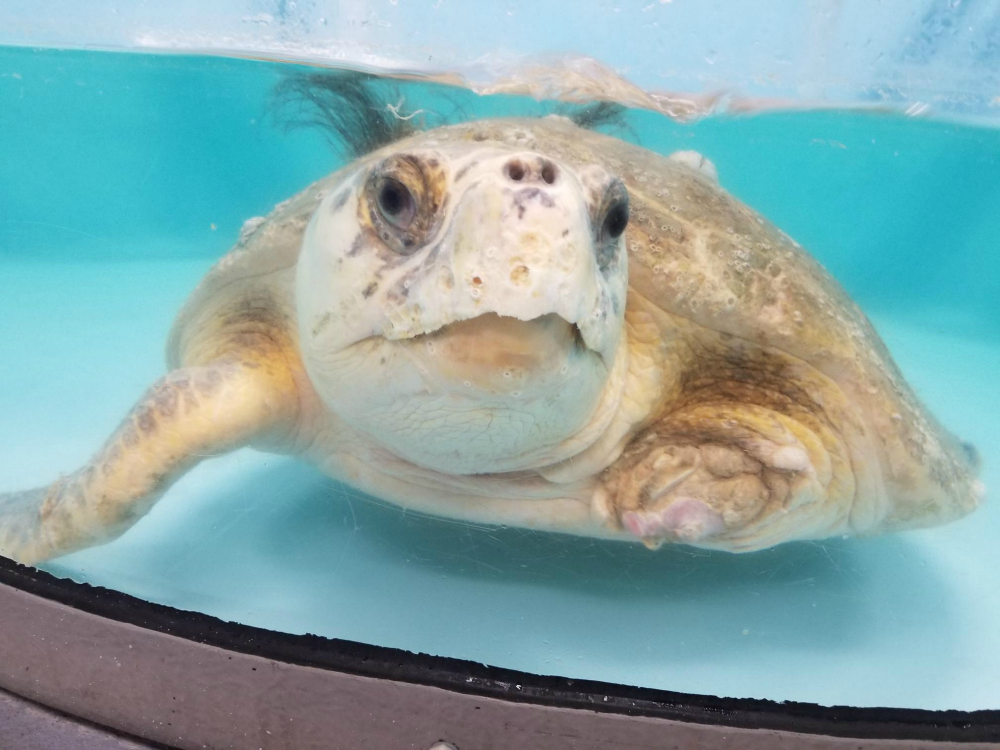
June 17, 2018: Professor McGonagall is adjusting well to her new home and even began eating the day after admit. However, McGonagall is very quiet and has abnormal buoyancy with her left side listing up. To better access what’s causing her to list, we did a CT scan of her lungs. The CT scan revealed a consolidated and non-functional right lung. It appears that it is filled with fibrin, a pus-like material that is associated with pneumonia. Given the extent of the lung infection, we are battling with a case of extremely severe pneumonia. We will be doing further diagnostics, via bronchoscopy, to confirm it as pneumonia and to figure out if it is viral or bacterial. Prognosis is currently guarded/poor.
August 1, 2018: McGonagall is much brighter and has more energy than she did at admit. Later this week, McGonagall will receive a bronchoscopy, with the help of Charleston Veterinary Referral Center, to better access the severity of the pneumonia present in her lungs. Through this, we will gain more insight about her prognosis and the next steps in her treatment. Her missing left, front flipper is healing up really well.
August 15, 2018: McGonagall received a bronchoscopy to help evaluate the state of her right lung. Her right lung is full of a hard pus material called fibrin and is barely inflating when she takes a breath. This week, we are going to do another surgical procedure to help evaluate the lung as a whole, by making a small incision in the soft tissue near her back flippers. We’ll then insert a scope to see the lung. Our vet team is hopeful that she will be able to recover from this severe case of pneumonia.
September 1, 2018: McGonagall is one strong turtle now that she’s feeling better! She’s now in a full tank, she’s super active and looks great! Luckily for our staff, McGonagall only has a few antibiotics injections left and will no longer have to pulled twice weekly. Later this week, McGonagall will receive another CT to evaluate the status of her lungs.
October 15, 2018: McGonagall continues to be our feistiest patient when we pull her for medical treatments or exams. We are closely monitoring the status of her lung through CT scans to make sure the infection present in her right lung is improving. McGonagall has lost a little weight so we have increased her diet. She’s now getting nearly 5 pounds of fish a day!
November 1, 2018: Overall, McGonagall seems to be doing well! Thanks to the generous Island Turtle Team’s donation, we will be able to purchase a new endoscope that will allow us to better assess her right lung. We will be scheduling that procedure in the weeks to come. Other than that, McGonagall she’s doing great, and we are hopeful she’ll be a release candidate in the future.
November 15, 2018: McGonagall has a big day ahead of her tomorrow; she will be anesthetized for an ultrasound and endoscopic procedure. Our vet team will be doing another endoscopy to reassess how her lung is healing; she will receive another CT scan as well. All of these procedures are to ensure that her lung is healing well and that the pneumonia is no longer present. Otherwise, McGonagall is still an incredibly strong turtle, a great eater and very active.
December 1, 2018: Professor McGonagall did not receive an endoscopy as stated in her last update; the procedure had to be rescheduled. However, she did receive a CT scan and ultrasound and so far, everything looks good. McGonagall’s endoscopy has been rescheduled for next week, and if all goes as planned, we will have a better idea of how her lungs look.
December 15, 2018: Professor McGonagall’s endoscopy was successful! Her right lung does not appear to be infected but is no longer functional due to the severe case of pneumonia that was present when she was admitted. Her left lung tissue looks nice and healthy. The day following her procedure, we were able to move her to a larger tank is Zucker Family Sea Turtle Recovery so that we can monitor her buoyancy and see how she does in a larger tank. We have kept the water level low so that she is more comfortable but will slowly increase it as she gets used to her new home. We are still evaluating whether or not she will be a release candidate in the future.
January 1, 2019: Professor McGonagall had a little bit of an adjustment period when she was moved into a larger tank. She still has a slight list to one side, which is why we haven’t been able to really increase her water. She’s eating well and is very active, which are good signs. We are going to do another CT to see what’s going on with her lungs and find out why she is still listing next week.
January 15, 2019: Last week, vet staff sedated McGonagall for a CT to check on her lungs and do a physical exam. Her left lung showed that she had a touch of pneumonia, so she was started back on antibiotics to help clear it up. Because we will have to pull her for an injection weekly, we decided to move her to a shorter tank to better accommodate that. She will receive another CT scan to make sure the lungs are clearing up. Don’t worry though, through all of this, McGonagall is still as feisty as ever!
February 1, 2019: J.K. Rowling is doing much better and is now in a full tank down. She is finished with her round of antibiotics to treat the mild pneumonia that she developed and will receive a follow up CT.
February 15, 2019: Professor McGonagall has been doing really great since her last update. She will receive another CT scan in the next month to evaluate her lungs.
March 1, 2019: Professor McGonagall has really mellowed out, is eating really well and is overall doing good. She still seems so have an occasional slight list to the left, meaning her left side is slightly elevated and not flat on the bottom. We will schedule her CT scan once we have TR7 (the large tall tank) empty so we can move her on the same day.
March 15, 2019: Now that Hagrid has been released, his old tank is open. Once the tank is disinfected and ready for a new patient, we will pull McGonagall for a CT scan and try her in the deep tank again to evaluate her ability to control her buoyancy in deeper water without a functional lung. If all goes well, that will become her new home.
April 1, 2019: McGonagall received a weight, full exam and CT scan and was moved into the largest and deepest tank in our facility. Luckily, we did not have to sedate her for her CT because we put her in a sea turtle harness, which usually helps calm them down. Each day, we slowly increase her water depth by an inch with the goal of getting her up to a full tank, at which point, we’ll evaluate her ability to control her buoyancy. So far, everything has been going well, and she is eating and swimming normally!
April 15, 2019: McGonagall has been doing wonderfully in her deep tank! We have been slowly increasing her water by a few inches daily, and she has been handling it well. She’s almost at a full tank! We hope that she continues to thrive in this new environment!
May 4, 2019: Professor McGonagall has been doing fantastic! She reached a major mile stone: full water depth in our deepest tank in the Care Center. She has been able to maintain normal buoyancy and has been very active. Come check her out in Zucker Family Sea Turtle Recovery today!
May 15, 2019: Professor McGonagall is still loving life in her big tank! She will be pulled for a physical exam, weight and measurement at the end of the month to evaluate her as a potential release candidate.
June 15, 2019: Professor McGonagall was pulled for a physical exam and to receive a flipper tag in her remaining front flipper. One of the behaviors we see with McGonagall is that after she is pulled from a tank, she has a difficult time in correcting her buoyancy if she cannot touch the bottom. We often have to lower the tank level and slowly increase it back up to full, and it can take her up to a week to acclimate. Due to this, it has been unclear if she will be a release candidate. Unfortunately, after her tagging, she did not do well in a deep tank and we had to lower the water level and let her adjust back to a full tank. Other than that, her bloodwork, body condition and weight all check out.
May 15, 2019: Professor McGonagall is still loving life in her big tank! She will be pulled for a physical exam, weight and measurement at the end of the month to evaluate her as a potential release candidate.
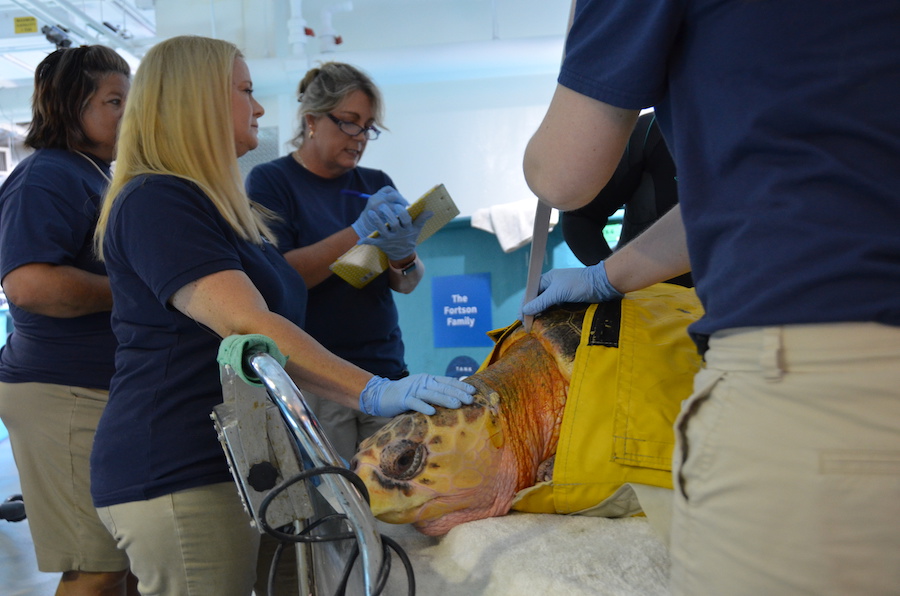
June 15, 2019: Professor McGonagall was pulled for a physical exam and to receive a flipper tag in her remaining front flipper. One of the behaviors we see with McGonagall is that after she is pulled from a tank, she has a difficult time in correcting her buoyancy if she cannot touch the bottom. We often have to lower the tank level and slowly increase it back up to full, and it can take her up to a week to acclimate. Due to this, it has been unclear if she will be a release candidate. Unfortunately, after her tagging, she did not do well in a deep tank and we had to lower the water level and let her adjust back to a full tank. Other than that, her bloodwork, body condition and weight all check out.
July 16, 2019: Nothing new to report on Professor McGonagall! She is eating and swimming well. We are still evaluating whether or not she will be a release candidate due to her behavior and inability to control her buoyancy in deep water.
August 1, 2019: Professor McGonagall has a decent appetite and activity level. She is currently doing well in her deep tank.
August 15, 2019: Earlier this month, staff noticed a fairly large mass growing near her tail. Vet staff removed the mass and took a biopsy to figure out what it is, and we are still awaiting the results of the biopsy.
September 1, 2019: To prep for Hurricane Dorian, McGonagall was moved up to the first floor in a portable system. We thought she was going to be very splashy in her new tank, but she remained calm, cool and collected. After the storm passed, she was moved back into her tank in the ICU.
October 1, 2019: McGonagall is still unable to normally control her buoyancy in deeper water. She is still in a tank in the ICU as we continue to evaluate whether or not she will be a release candidate.
December 1, 2019: Professor McGonagall is down in our ICU and is doing well. We are pulling her monthly for weights and measurements, and we are brainstorming a surgical approach to treat her right lung, which is essentially not functional at the current time.
Professor McGonagall is down in our ICU and is doing well. We are pulling her monthly for weights and measurements, and we are brainstorming a surgical approach to treat her right lung, which is essentially not functional at the current time.
January 15, 2020: Professor McGonagall was pulled for a weight, measurement and physical exam this week. We are waiting for the equipment needed to do another bronchoscopy to access the viability of her right lung. Overall, she’s looking good!
April 1, 2020: A bronchoscopy will be scheduled within the coming months to access the status of her lung. Other than that, she’s hanging in there, is at a healthy weight, and is eating well!
May 1, 2020: Nothing new to report here with Professor McGonagall. Due to Covid-19, we are pushing her bronchoscopy to sometime in the coming month or two.
July 15, 2020: We are hoping to perform the bronchoscope on Professor McGonagall within the next couple of weeks to assess the lung, and remove any exudate that is blocking the entry to the bronchi, preventing the lung to fully inflate. It is likely we will need to repeat this process multiple times as sea turtle’s bodies tend to regenerate quickly to try to seal or “wall off” any irritated areas. Fingers crossed for a good outcome for this big girl!
August 10, 2020: We were able to perform a second bronchoscopy on Professor McGonagall to assess the situation. We had hoped that we might be able to access the bronchi and re-inflate her damaged lung using the bronchoscope. We knew this would be a crucial step to her ultimate recovery and prognosis. Unfortunately, when vet staff visualized the bronchi with the scope, it was completely filled in and not penetrable with even our largest, strongest tools. It appeared her lung is completely non-functional, and the lung tissue in her other lung was showing some compromise as well. This confirmed that there is nothing more that can be done to make her a releasable animal. That, in combination with long-term quality of life issues, has brought us to the difficult decision to euthanize her, a decision that was not made lightly. Our vet team will be performing a necropsy, or animal autopsy, to learn from her case and apply that acquired knowledge to similar cases in the future. Thank you for your support in caring for her over the past two years.


